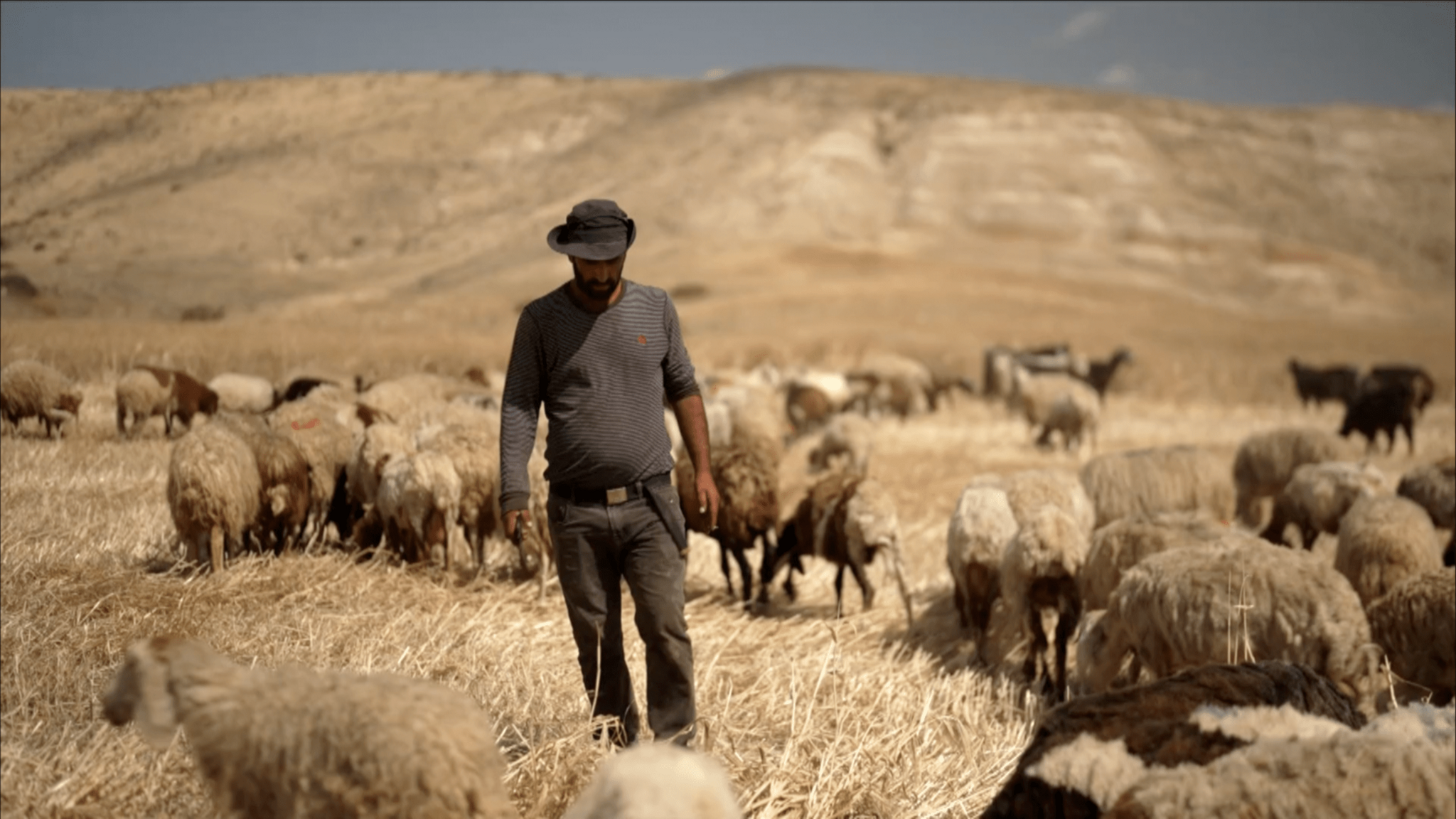BBC team's tense encounter with sanctioned Israeli settler while filming in West Bank
Moment BBC has tense encounter with sanctioned Israeli settler
- Published
Dust was rising on the track. It hung in the hot midday air as the white jeep came towards us. The driver was less than a minute away.
"I think it's Moshe Sharvit," said Gil Alexander, 72, a devout religious Jew who tries to protect Palestinian shepherds from intimidation by Jewish settlers.
Over the last year we've been documenting his work with shepherds in the northern Jordan Valley, in the Israeli-occupied West Bank.
The man approaching us was placed under sanctions by Britain and the EU last year after they said he had used "physical aggression, threatened families at gunpoint, and destroyed property as part of a targeted and calculated effort to displace Palestinian communities".
In a case reported by our colleagues at BBC Eye Investigates last year, a Palestinian grandmother alleged that Moshe Sharvit had forced her to leave her family home in October 2023. Ayesha Shtayyeh also said he pointed a gun at her head and threatened to kill her.
"We've been here for 50 years…What have I ever done to him?" she asked when BBC Eye interviewed her.
She said her family's troubles began after Moshe Sharvit established a so-called 'outpost'- a settlement that is illegal under both Israeli and international law - chasing away the family's sheep, damaging property and constantly threatening them. The alleged incident with the gun was the final straw.
Moshe Sharvit did not respond to BBC Eye's requests for a response to Ayesha's account.
Back on the mountainside, the man accused of this violence stopped his car and approached us. Nodding towards Gil Alexander he asked us: "Do you know he's a very dangerous guy?"
When our translator explained to Moshe Sharvit we were from the BBC he said: "Ah the BBC… great lovers of Israel…" He went on to call us bad and dangerous people.
Addressing our translator he said: "So, do you understand that they're the people who are most dangerous to the State of Israel?"
Then he phoned the police, asking them to come to the scene. When he wasn't calling the police he filmed us filming him.
Moshe Sharvit and Gil Alexander represent starkly different visions of Israel's future.
Moshe Sharvit believes all of the West Bank - which settlers and the Israeli government call Judea and Samaria - were given by God to the Jews.
In this he is supported by senior ministers in the government, including the Minister of Finance, Bezalel Smotrich, and the Minister of Public Security, Itamar Ben-Gvir. Both men are settlers and leaders of far-right ultranationalist parties.
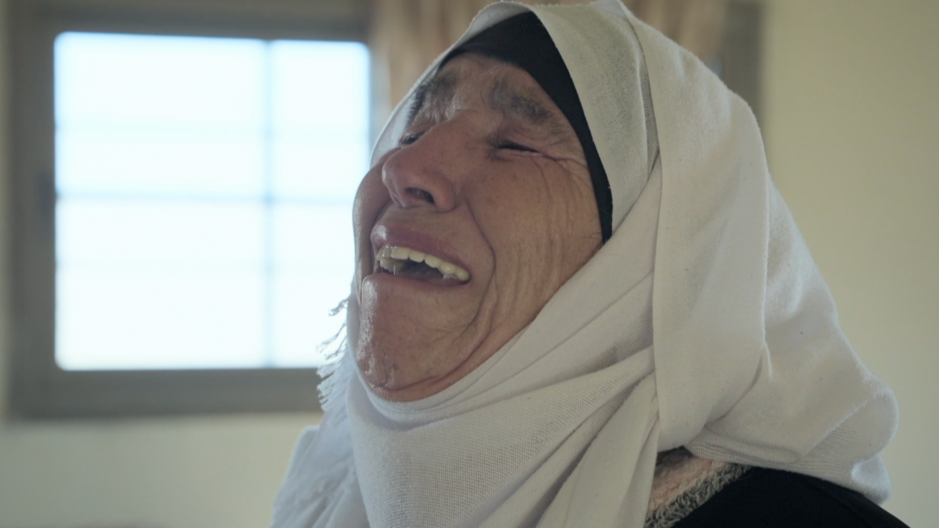
Ayesha Shtayyeh alleges Moshe Sharvit threatened her with a gun and told her to leave her home of 50 years
Smotrich has said Gaza will be "totally destroyed" and that its people will be "totally despairing, understanding that there is no hope and nothing to look for in Gaza and will be looking for relocation to begin a new life in other places".
The 'other places' he envisages are foreign countries. Ben-Gvir, who is responsible for the police, has convictions for inciting racism and supporting a terrorist organisation.
Israel's Prime Minister, Benjamin Netanyahu, relies on the support of the far-right settler movement to keep his government in power.
He criticised the sanctions imposed on Moshe Sharvit and other settlers, saying his government viewed the move "with great severity". US sanctions against Moshe Sharvit were dropped when President Donald Trump came to power.
The UN's top court ruled last year that Israel's occupation of the Palestinian territories is against international law and that all settlement activity is illegal.
Israel rejects this and argues that settlements are necessary for security, citing lethal attacks by Palestinian gunmen on settlers, such as the killing of three people last January in the West Bank.
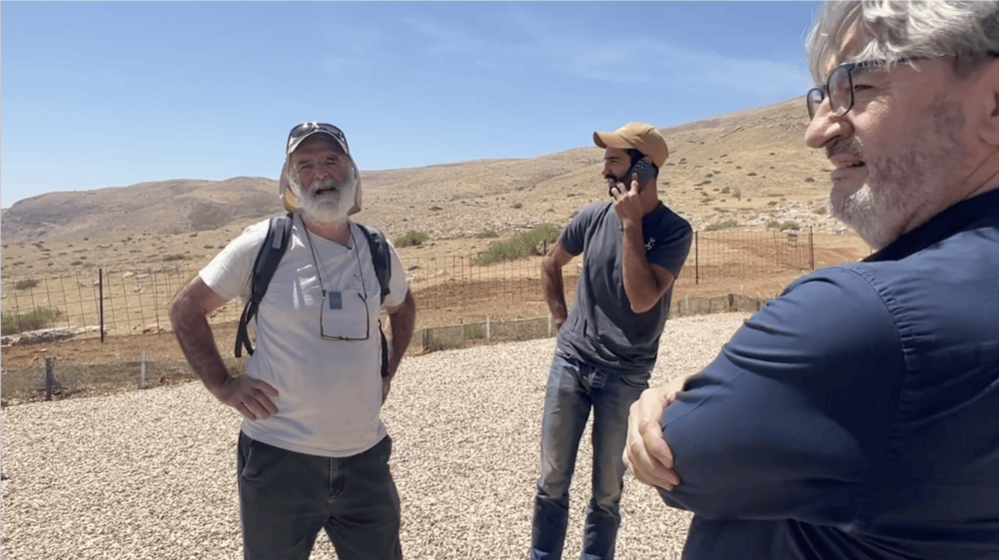
Gil Alexander (left) and Moshe Sharvit both phoned the police
Settlement expansion is anathema to Gil Alexander. He considers himself a Zionist, but within the existing borders of Israel.
These are the frontiers that existed before it seized the West Bank in the 1967 Middle East war.
He is part of a network called the Jordan Valley Activists – Moshe Sharvit calls them "anarchists" - offering solidarity, and working for peaceful co-existence with the Palestinians.
"What they [the settlers] want to see happen," Gil Alexander told us, "[is] that it will be an area completely free of Arabs. It isn't Moshe. It's all the people above him who sent him here. Meaning from the top".
Moshe Sharvit's desire to have the Jordan Valley empty of Palestinians is shared by the leader of the regional council, a government-supported body, David Elhayani, who has visited the sanctioned settler.
In his air conditioned office about 15km (9 miles) from Moshe Sharvit's settler outpost he told us "the notion of settler violence is an invention of the anarchist, extreme left meant to harm the settlement image".
As for the future of the Palestinians, he was emphatic. They should go to neighbouring Jordan.
"This country needs to be free of Arabs. It's the only way. It's a global interest. Why global? Because the minute there won't be Arabs here it will be a Jewish nation for the Jews who won't have to hurt each other, there won't be conflict, there won't be anything."
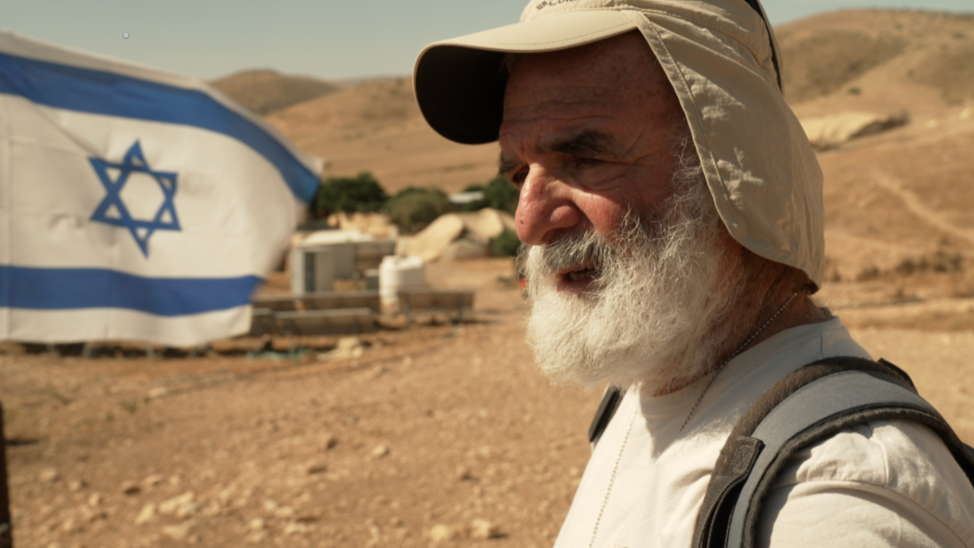
Gil Alexander, who describes himself as a Zionist, believes Israeli territory should end at the 1967 borders
Gil Alexander and Moshe Sharvit have a history of antagonism. During an altercation on a Palestinian farmer's land in January 2023, Moshe Sharvit says Gil Alexander tried to seize his firearm from its holster.
While speaking to our translator he produced a video of the incident on his phone.
"You can see Gil Alexander. Same hat and glasses. That's me. Here you see he grabs my gun."
Gil Alexander says he was acting in self-defence after Moshe Sharvit had grabbed his walking stick, and the phone of a woman friend who he alleges was pushed violently to the ground.
He says he feared Moshe Sharvit was going to use the weapon. As a result, Moshe Sharvit got a restraining order which forbids Gil Alexander from being within 2.5km (1.5 miles) of his farm.
The police have charged Gil Alexander with illegal possession of a weapon (the one he allegedly tried to take from Moshe Sharvit) and assault. The issue will be considered by the Israeli courts.
Moshe Sharvit himself is the subject of a restraining order forbidding him to approach a Palestinian family living near his outpost for six months, since March this year.
During our encounter the settler claimed that Gil Alexander had breached his restraining order by taking us to the high ground overlooking the valley. The peace activist told us later that he had mistakenly strayed just over half a kilometre inside the area of the order.
Although Moshe Sharvit's settlement is illegal, even under Israeli law, it has not been removed.
Human rights organisations and numerous eyewitnesses testify that the Israeli army and police frequently stand by while settlers attack Palestinian villages.
The violence has escalated sharply since the 7 October 2023 Hamas attack on Israel in which about 1,200 people were killed and 251 kidnapped, and which triggered the Gaza war.
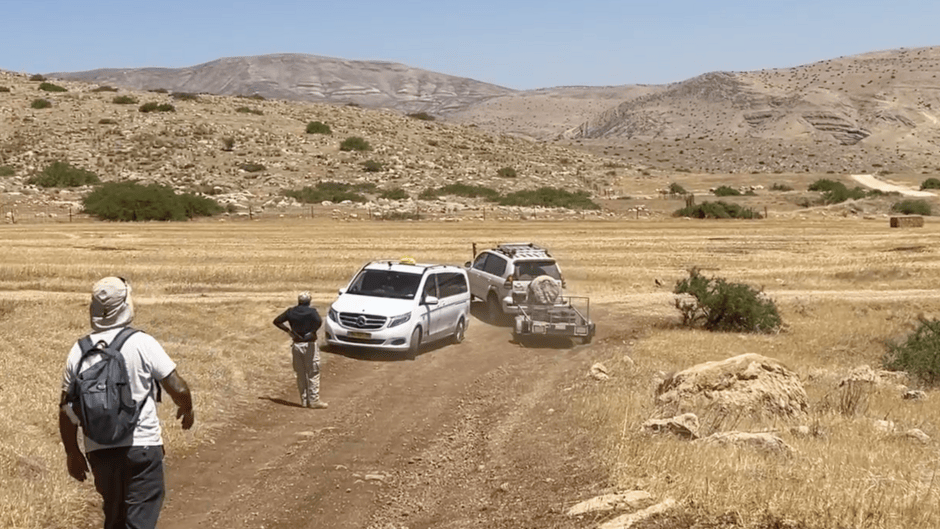
Moshe Sharvit approached, blocked the road and phoned the police
According to a report issued by the UN office for Humanitarian Affairs there were 1,804 attacks by settlers against Palestinians in the period January 2024 to March 2025.
The Israeli human rights group, Yesh Din (There is Law), reported that only 3% of complaints made against settlers resulted in a conviction. In six days last month - from 22 to 28 April - the UN recorded 14 incidents involving settlers that left 36 Palestinians injured.
In the tense atmosphere on the mountainside, and wanting to avoid any escalation, we decided to leave.
As we walked away, Moshe Sharvit went to his jeep and drove ahead of us, stopping where the track turned down the mountain. Our way out was blocked. There was no-one we could appeal to apart from the man preventing us from leaving.
Again, he phoned the police asking them to come. Gil Alexander phoned the police and his lawyer. Our team was worried that more settlers would come.
Then something surprising happened. I suggested to Moshe Sharvit that he should agree to be interviewed. After a brief pause, he said: "Bring the camera."
What followed was less an interview, than a series of declarations. He was doing the work of God, he said.
Why did local Bedouin shepherds say they were very afraid of him? I asked.
"No, that is a lie. They're telling stories so the world will think we're crazy. It's not true. It's all lies that are built on lies of dozens of years of lying…" he said.
"The Arabs, since the formation of the country and before - all the past 77 years they've been preoccupied with harming the people of Israel, harming the land of Israel and causing the nation of Israel to be miserable and pitiful. But they don't understand that the harder they try, the Lion will wake from his sleep and within one day we'll end this story."
He repeated the analogy of the Lion later in the interview saying, in what sounded like ominous words, that the Palestinians were "pushing the lion so hard into the corner that there will be no choice left but to finish this story".
"7 October was small. One day it'll be big."
As for peaceful co-existence such as Gil Alexander supports, he said there was "no such thing as peace with enemies who try to destroy you".
Moshe Sharvit's brother Harel was killed fighting in Gaza in December 2023.
His world is the pastureland, the stony hills of the Jordan Valley, his sheep and cattle, the bed and breakfast he has opened.
He produced a glossy video, replete with a backing track of American country music, to promote his venture.
He spoke with contempt for the British sanctions against him. They were a new kind of antisemitism, he claimed.
"The minute someone tries to hurt me I get stronger. My spirit…I receive energies, my spirit continues on its mission, I continue advancing forward and planting roots deep into the land of Israel. I'm not bothered by Britain or America or anyone."
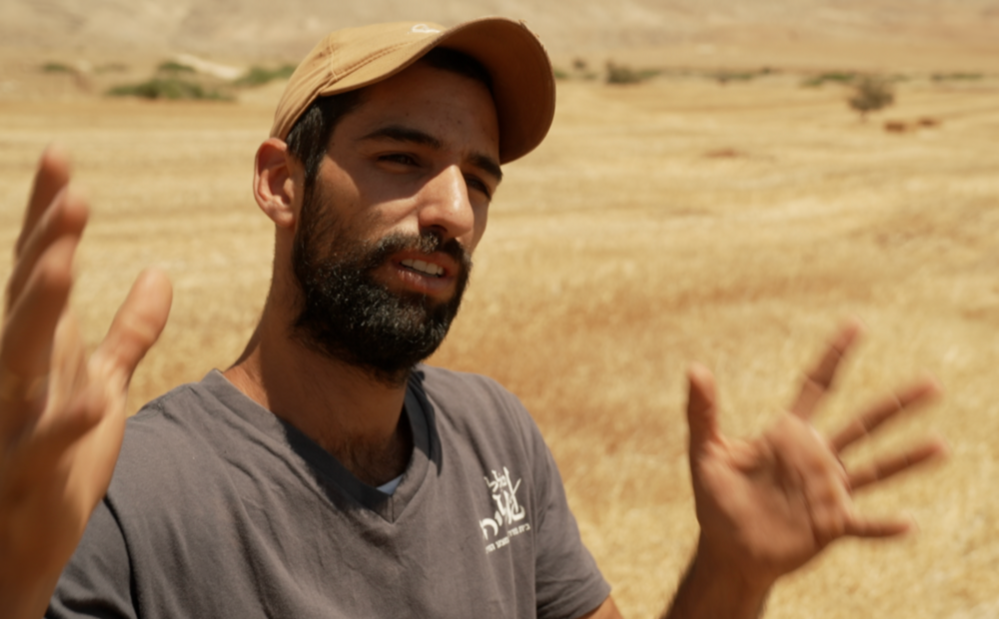
Moshe Sharvit agreed to be interviewed
Then he drove away. We were free to move on. Later as we were having lunch in a café about 15km (nine miles) away, a policeman appeared, looking for Gil Alexander.
He went with the police officer for questioning. After about an hour he returned, telling us he had been ordered not to enter the Jordan Valley for two weeks. He plans to lodge his own complaint against Moshe Sharvit over the incident.
We went to Gil Alexander's home in a kibbutz inside Israel that overlooks the Valley. Gunmen from the Palestinian city of Jenin fired at the kibbutz two years ago.
Gil Alexander is not a pacifist. If he is attacked by Hamas or any other group, he will defend himself.
He said: "A son of our friends, two months ago he was killed here by a terrorist. He was a soldier in the reserves, 46 years old with six children. He volunteered for the reserves to protect me."
"If the army hadn't been there, they would have come here. He was killed while defending me. And today he is buried next to my two sons."
But Gil Alexander seemed weary as we sat drinking tea amid the bright red flowers of his well-tended garden, and the fluttering yellow flags that symbolise Israel's hostages held in Gaza.
He spoke of a beloved nephew killed fighting in Lebanon in an earlier war.
Did he not, I wondered, at the age of 72, think about retiring from the struggle and enjoying his garden? He laughed.
There was no chance of that. After two of his sons took their own lives – one was in the army, the other was about to enter the military – he had found a purpose in working for what he calls the "humanitarian" ideals of Judaism.
"After the tragedies of my sons, if I don't find meaning in life, I'll go crazy… And the things I do, are things I believe in. And these are things I also got from my father who was in the French underground during World War Two and fought for French liberation but was against any type of occupation and said, 'Occupation is Occupation.'"
Two days after our encounter with Moshe Sharvit, a lone woman peace activist filmed him banging on the window of her car and rocking the vehicle.
The woman is clearly frightened by the intimidation. Moshe Sharvit acts as if he has nothing to fear.
With additional reporting by Oren Rosenfeld and Nik Millard.
- Published3 September 2024
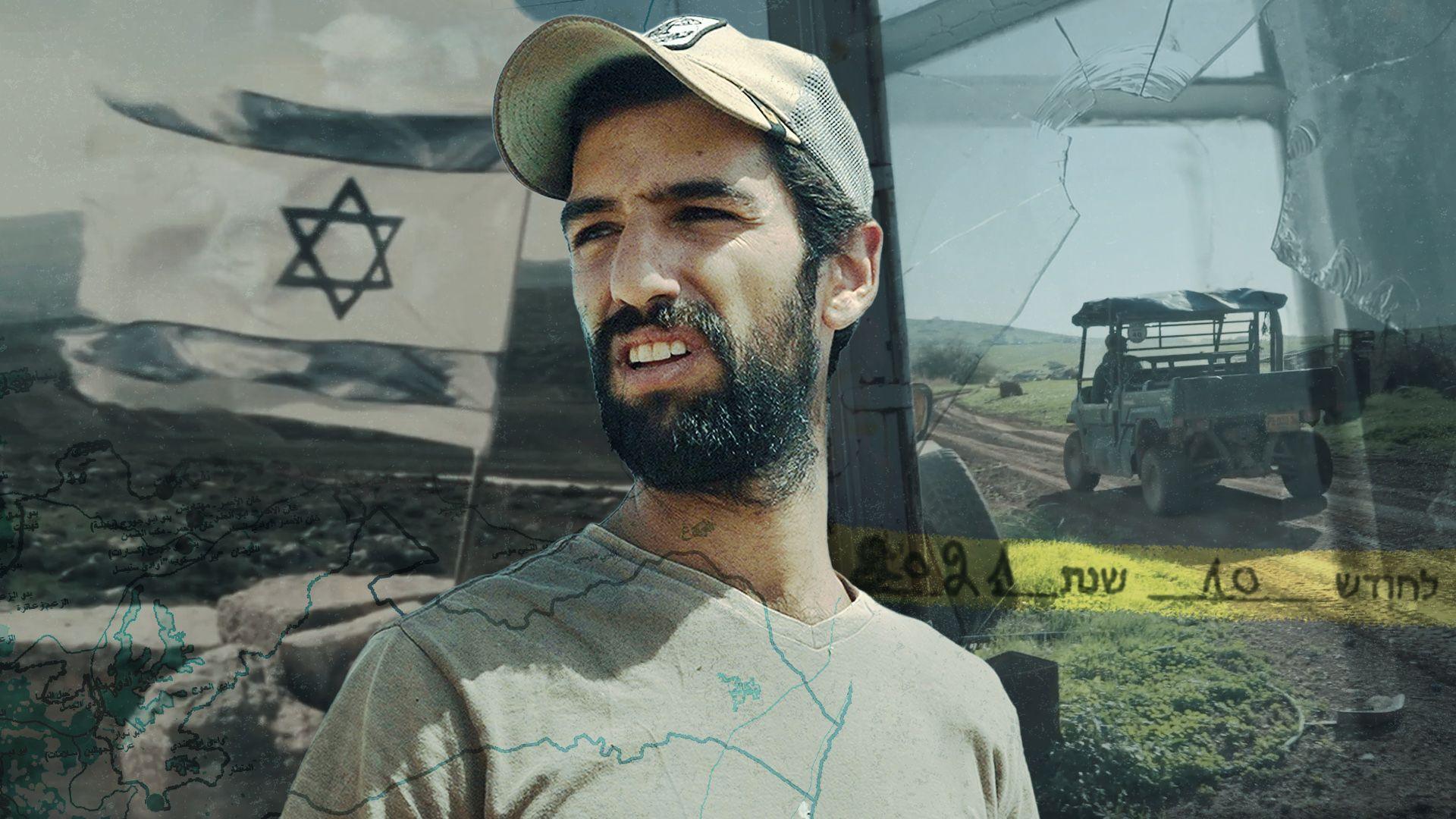
- Published9 August 2024
